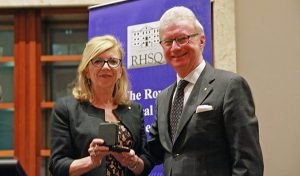Look to the past, live in the present, and move into the future. It is an ethical code that I put forward for professional historians. Like all codes, it will never settle historiographical debates, but it has a simple point to it that may guide our way. As historians we want to understand the past, but we ought not to endeavour to live in the past. Our critical capabilities as historians tells that, as much as we inherit choices and habit in time gone-by, the living is the now, and the ability to choose what is at hand is the step into the future. Historical insight also tells us that for the sake of a better future we need to put old habits aside; perhaps just retaining a few sets of crusty habits as part of our charming character but a willingness, nevertheless, to always develop new ones over against old practices.
Now that we are in the early stages of the second decade of the twenty-first century, we can be somewhat reassured that tangible history books and articles will continue to be with us. It doesn’t appear to be going the way of the telegram. The editor still needs you (please) to submit book reviews. Technological history has that trick where, at the time, we could never be too sure what systems are completely replaced, what will adapted into new forms, and what will remain as just another alternative medium where the new technology proves only to be an add-on.
There is no doubt that, as professional historians, we will continue to use the communication mediums we have always used. However, it would be foolish not to start using the technologies that, to be frank, are not really “new”. In 2012 the PHAQ has to catch-up with web-based technologies and get them working as an effective set of tools for the benefit of members.
We have started a process to re-develop the PHAQ website and, as you can see right now before your eyes, we have integrated the e-Bulletin into the website. This has to be just a beginning. Although I would never have thought I would be saying this a few months ago, I believe that one of most exciting new tools for members is the PHAQ Facebook Page. It has just been set-up and those members who are happy to wander around Facebook world; you can find it at https://www.facebook.com/groups/phaqld . It is a closed group so the communication is not opened to the public, only to the members of the PHAQ group. To join send a notification from the site and the administrators will add you on. If you have any problems or questions about joining the PHAQ Facebook Page, please email the editor (ebulletin@qldhistorians.org.au).
It is exciting because it means that PHAQ members now have the practical means to communicate on daily basis to each other, and will be able to share information in the form of text, photographs and video. There are also tools to chat online, set-up events, and work on shared documents. We all live busy lives with our own projects but the Management Committee encourages you to get actively involved in your professional association. The PHAQ is there to benefit you professionally and really only works as a matter of collaborations with your historian colleagues. The PHAQ Facebook Page is only one useful tool to do this. There are other tools. Further articles in this edition pick up on additional options for PHAQ collaboration. But whatever technology you use, get involved in the work of the PHAQ.


